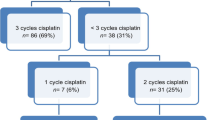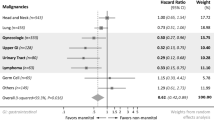Abstract
Background
An incidence of cisplatin-induced acute kidney injury (AKI) of 34% has been reported in patients with locally advanced head and neck squamous cell carcinoma (LA-HNSCC). However, delayed cisplatin-induced nephrotoxicity and long-term renal outcomes remain poorly studied.
Methods
Patients with LA-HNSCC who underwent definitive or postoperative cisplatin-based chemoradiotherapy (CRT) were included. Acute kidney disease (AKD) was defined as newly developed estimated glomerular filtration rate (eGFR) < 60 ml/min/1.73 m2 for < 3 months, ≥ 35% decrease in eGFR, or > 50% increase in serum creatinine for <3 months from baseline.
Results
A total of 509 patients were analyzed. AKD and AKI occurred in 27.9% and 13.4% of patients, respectively. Most patients had primary prophylactic feeding tube (95%) and definitive CRT (83%). More AKD patients had an ECOG status of 0 (p = 0.017), diabetes (p = 0.044), and hypertension (p < 0.001). AKI, but not AKD, was significantly associated with cumulative cisplatin dose, delay, dose reduction, termination, and hospitalization during CRT. GFR percentage in patients with AKD declined significantly during CRT (− 36%), worsened at 3 months (− 39%), and had not recovered to baseline at 12 months after CRT (− 29%). Multivariate analysis identified ECOG status 0 and hypertension as significantly associated with the development of AKD.
Conclusion
Almost one third of LA-HNSCC patients who underwent CRT with cisplatin developed AKD, and their eGFR did not recover to baseline even after 1 year. ECOG 0 and hypertension were associated with AKD. These findings may have been due to the physician’s awareness of AKD and underestimation of its potential complications in fit patients.


Similar content being viewed by others
References
The Ministry of Public Health, Thailand, Hospital Based Cancer Registry 2016. 2016
2014 Review of Cancer Medicines on the WHO List of Essential Medicines. Head and Neck Cancer. Union for International Cancer Control 2014
Kim L, King T, Agulnik M (2010) Head and neck cancer: changing epidemiology and public health implications. Oncology 24:915–924
Pignon J-P, Maître A, Maillard E, Bourhis J (2009) Meta-analysis of chemotherapy in head and neck cancer (MACH-NC): an update on 93 randomised trials and 17,346 patients. Radiother Oncol 92:4–14
Hartmann JT, Lipp HP (2003) Toxicity of platinum compounds. Expert Opin Pharmacother 4:889–901
Miller RP, Tadagavadi RK, Ramesh G, Reeves WB (2010) Mechanisms of cisplatin nephrotoxicity. Toxins 2:2490–2518
Perazella MA (2019) Drug-induced acute kidney injury: diverse mechanisms of tubular injury. Curr Opin Crit Care 25(6):550–557
Madias NE, Harrington JT (1978) Platinum nephrotoxicity. Am J Med 65:307–314
Lam M, Adelstein DJ (1986) Hypomagnesemia and renal magnesium wasting in patients treated with cisplatin. Am J Kidney Dis 8:164–169
Kim YK, Byun HS, Kim YH, Woo JS, Lee SH (1995) Effect of cisplatin on renal function in rabbits: mechanism of reduced glucose reabsorption. Toxicol Appl Pharmacol 130:19–26
Cao L, Joshi P, Sumoza D (2002) Renal salt-wasting syndrome in a patient with cisplatin-induced hyponatremia: case report. Am J Clin Oncol 25:344–346
Sasaki T, Motoyama S, Komatsuda A, Shibata H, Sato Y, Yoshino K, Wakita A, Saito H, Anbai A, Jin M, Minamiya Y (2016) Two cases of cisplatin-induced permanent renal failure following neoadjuvant chemotherapy for esophageal cancer. Int J Surg Case Rep 20:63–67
Brillet G et al (1994) Long-term renal effect of cisplatin in man. Am J Nephrol 14:81–84
Crona DJ, Faso A, Nishijima TF, McGraw KA, Galsky MD, Milowsky MI (2017) A systematic review of strategies to prevent cisplatin-induced nephrotoxicity. Oncologist 22:609–619
Oh G-S, Kim HJ, Shen AH, Lee SB, Khadka D, Pandit A, So HS (2014) Cisplatin-induced kidney dysfunction and perspectives on improving treatment strategies. Electrolyte Blood Press 12:55–65
Reece PA, Stafford I, Russell J, Khan M, Gill PG (1987) Creatinine clearance as a predictor of ultrafilterable platinum disposition in cancer patients treated with cisplatin: relationship between peak ultrafilterable platinum plasma levels and nephrotoxicity. J Clin Oncol 5:304–309
Okada A, Fukushima K, Fujita M, Nakanishi M, Hamori M, Nishimura A, Shibata N, Sugioka N (2017) Alterations in cisplatin pharmacokinetics and its acute/sub-chronic kidney injury over multiple cycles of cisplatin treatment in rats. Biol Pharm Bull 40:1948–1955
Kobayashi R et al (2016) Risk analysis for cisplatin-induced nephrotoxicity during first cycle of chemotherapy. Int J Clin Exp Med 9:3635–3641
Latcha S, Jaimes EA, Patil S, Glezerman IG, Mehta S, Flombaum CD (2016) Long-term renal outcomes after cisplatin treatment. Clin J Am Soc Nephrol 11:1173–1179
Machtay M, Moughan J, Trotti A, Garden AS, Weber RS, Cooper JS, Forastiere A, Ang KK (2008) Factors associated with severe late toxicity after concurrent chemoradiation for locally advanced head and neck cancer: an RTOG analysis. J Clin Oncol 26:3582–3589
Argiris A, Li Y, Murphy BA, Langer CJ, Forastiere AA (2004) Outcome of elderly patients with recurrent or metastatic head and neck cancer treated with cisplatin-based chemotherapy. J Clin Oncol 22:262–268
Dash A, Galsky MD, Vickers AJ, Serio AM, Koppie TM, Dalbagni G, Bochner BH (2006) Impact of renal impairment on eligibility for adjuvant cisplatin-based chemotherapy in patients with urothelial carcinoma of the bladder. Cancer 107:506–513
Perkins BA, Krolewski AS (2009) Early nephropathy in type 1 diabetes: the importance of early renal function decline. Curr Opin Nephrol Hypertens 18:233–240
Hill GS (2008) Hypertensive nephrosclerosis. Curr Opin Nephrol Hypertens 17:266–270
Sato K, Watanabe S, Ohtsubo A, Shoji S, Ishikawa D, Tanaka T, Nozaki K, Kondo R, Okajima M, Miura S, Tanaka J, Sakagami T, Koya T, Kagamu H, Yoshizawa H, Narita I (2016) Nephrotoxicity of cisplatin combination chemotherapy in thoracic malignancy patients with CKD risk factors. BMC Cancer 16:222
Shord SS, Thompson DM, Krempl GA, Hanigan MH (2006) Effect of concurrent medications on cisplatin-induced nephrotoxicity in patients with head and neck cancer. Anti-Cancer Drugs 17:207–215
Almanric K et al (2017) Risk factors for nephrotoxicity associated with cisplatin. Can J Hosp Pharm 70:99–106
Motwani SS, McMahon GM, Humphreys BD, Partridge AH, Waikar SS, Curhan GC (2018) Development and validation of a risk prediction model for acute kidney injury after the first course of cisplatin. J Clin Oncol 36:682–688
Faig J, Haughton M, Taylor RC, D’Agostino RB Jr, Whelen MJ, Porosnicu Rodriguez KA, Bonomi M, Murea M, Porosnicu M (2018) Retrospective analysis of cisplatin nephrotoxicity in patients with head and neck cancer receiving outpatient treatment with concurrent high-dose cisplatin and radiotherapy. Am J Clin Oncol 41:432–440
Bhat ZY, Cadnapaphornchai P, Ginsburg K, Sivagnanam M, Chopra S, Treadway CK, Lin HS, Yoo G, Sukari A, Doshi MD (2015) Understanding the risk factors and long-term consequences of cisplatin-associated acute kidney injury: an observational cohort study. PLoS One 10:e0142225
Capuano G, Grosso A, Gentile PC, Battista M, Bianciardi F, di Palma A, Pavese I, Satta F, Tosti M, Palladino A, Coiro G, di Palma M (2008) Influence of weight loss on outcomes in patients with head and neck cancer undergoing concomitant chemoradiotherapy. Head Neck 30:503–508
Gama RR, Song Y, Zhang Q, Brown MC, Wang J, Habbous S, Tong L, Huang SH, O'Sullivan B, Waldron J, Xu W, Goldstein D, Liu G (2017) Body mass index and prognosis in patients with head and neck cancer. Head Neck Oncol 39:1226–1233
Kellum JA et al (2012) Kidney disease: improving global outcomes (KDIGO) acute kidney injury work group. KDIGO clinical practice guideline for acute kidney injury. Kidney Int Suppl 2(1):1–138
Ostermann M, Joannidis MJCC (2016) Acute kidney injury 2016: diagnosis and diagnostic workup. Crit Care 20(1):299
Levey AS et al (1999) A more accurate method to estimate glomerular filtration rate from serum creatinine: a new prediction equation. Ann Intern Med 130(6):461–470
Levey AS, Coresh J, Greene T, Stevens LA, Zhang Y(L), Hendriksen S, Kusek JW, van Lente F, for the Chronic Kidney Disease Epidemiology Collaboration* (2006) Using standardized serum creatinine values in the modification of diet in renal disease study equation for estimating glomerular filtration rate. Ann Intern Med 145(4):247–254
Hoek J et al (2016) Nephrotoxicity as a dose-limiting factor in a high-dose cisplatin-based chemoradiotherapy regimen for head and neck carcinomas. Cancers (Basel) 8(2):21
Crona DJ, Faso A, Nishijima TF, McGraw KA, Galsky MD, Milowsky MI (2017) A systematic review of strategies to prevent cisplatin-induced nephrotoxicity. Oncologist 22(5):609–619
James MT, Levey AS, Tonelli M, Tan Z, Barry R, Pannu N, Ravani P, Klarenbach SW, Manns BJ, Hemmelgarn BR (2019) Incidence and prognosis of acute kidney diseases and disorders using an integrated approach to laboratory measurements in a universal health care system. JAMA Netw Open 2(4):e191795
Ritz E, Fliser D, Siebels JA (1993) Pathophysiology of hypertensive renal damage. Am J Hypertens 6(7_Pt_2):241S–244S
Driessen CM et al (2019) Genetic variants as predictive markers for ototoxicity and nephrotoxicity in patients with locally advanced head and neck cancer treated with cisplatin-containing chemoradiotherapy (the PRONE study). Cancers (Basel) 11(4):551
Filipski KK, Mathijssen RH, Mikkelsen TS, Schinkel AH, Sparreboom A (2009) Contribution of organic cation transporter 2 (OCT2) to cisplatin-induced nephrotoxicity. Clin Pharmacol Ther 86(4):396–402
Riedemann L et al (2008) Megalin genetic polymorphisms and individual sensitivity to the ototoxic effect of cisplatin. Pharmacogenomics J 8(1):23
Trendowski MR, el Charif O, Dinh PC Jr, Travis LB, Dolan ME (2019) Genetic and modifiable risk factors contributing to cisplatin-induced toxicities. Clin Cancer Res 25(4):1147–1155
Funding
This study was funded by the Thailand Grand Challenge Program for Research University Network (RUN) under the Precision Medicine for Cancer project by the National Research Council of Thailand. N. Ngamphaiboon received funding from the RUN, the Thailand Research Fund, and a Research Development Grant from Ramathibodi Hospital.
Author information
Authors and Affiliations
Corresponding author
Ethics declarations
Conflict of interest
The authors declare that they have no conflict of interest.
Additional information
Publisher’s note
Springer Nature remains neutral with regard to jurisdictional claims in published maps and institutional affiliations.
Electronic supplementary material
ESM 1
(DOCX 26 kb)
Rights and permissions
About this article
Cite this article
Patimarattananan, T., Nongnuch, A., Pattaranutaporn, P. et al. Risk and impact of delayed renal impairment in patients with locally advanced head and neck squamous cell carcinoma receiving chemoradiotherapy with cisplatin. Support Care Cancer 29, 877–887 (2021). https://doi.org/10.1007/s00520-020-05566-y
Received:
Accepted:
Published:
Issue Date:
DOI: https://doi.org/10.1007/s00520-020-05566-y




